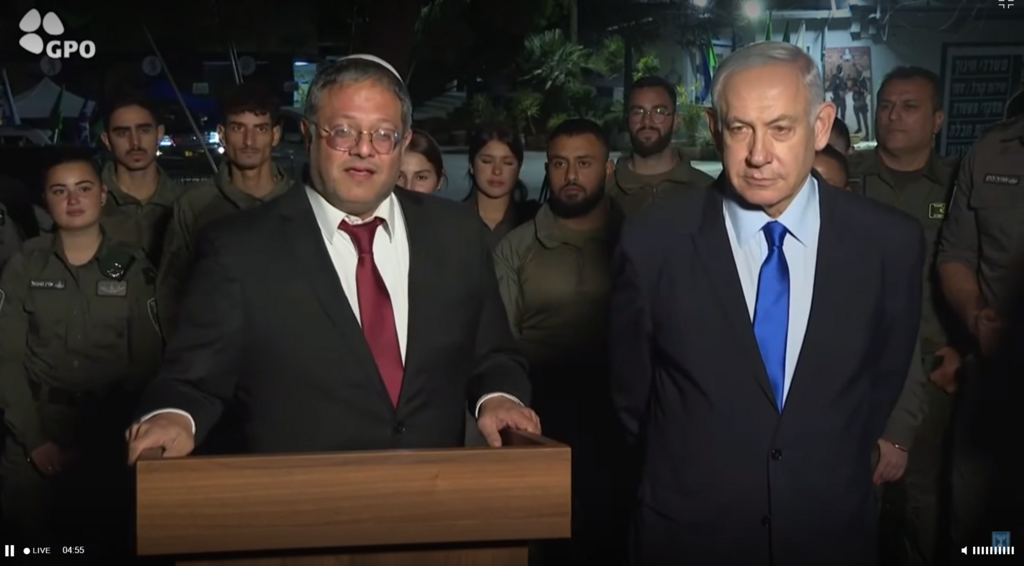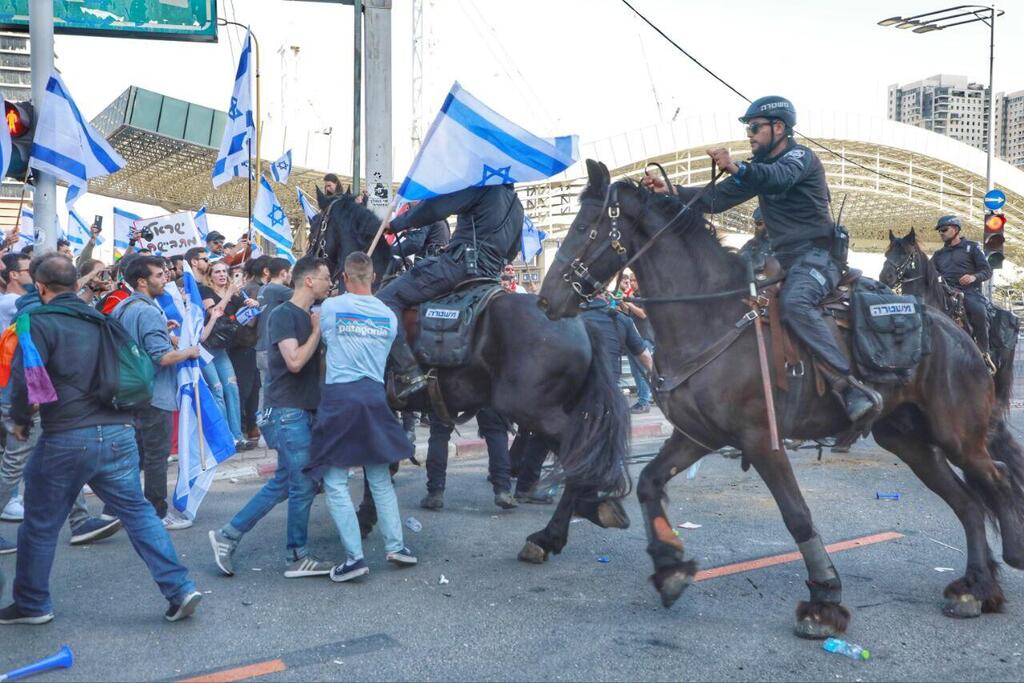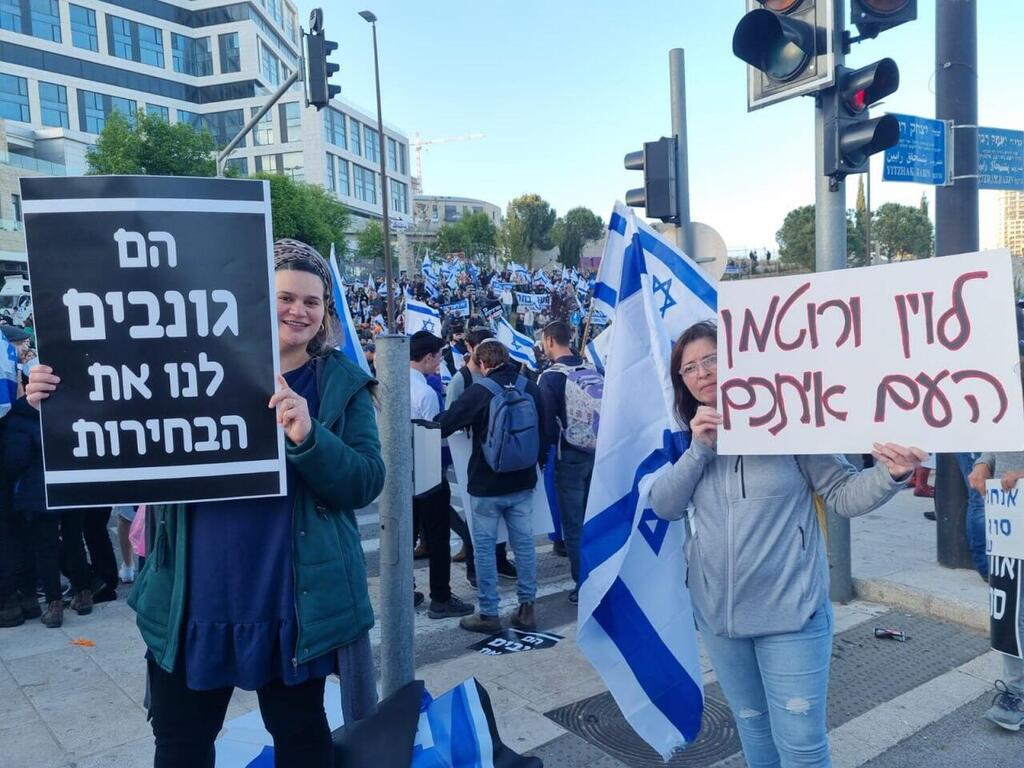Getting your Trinity Audio player ready...
Prime Minister Benjamin Netanyahu on Monday managed to convince the last holdout in his government, National Security Minister Itamar Ben-Gvir, to stop the legislative process of their judicial reform push and seek dialogue instead.
Related stories:
According to a statement by Ben-Gvir's far-right Otzma Yehudit faction, the party set an ultimatum for the government to complete the legislation by the end of the next Knesset session, which is due to close in late July.
The extension will also be contingent upon the establishment of a national guard force that will be subordinated to Ben-Gvir's ministry.
"Prime Minister Benjamin Netanyahu agreed with National Security Minister Itamar Ben-Gvir that the government will be given an extension to the next session to pass the reform through negotiations, and at the same time it was agreed between the two that as a step to increase governance, the establishment of a national guard *under the National Security Ministry* will be approved at the next Cabinet meeting, and the proposal will already be raised at the upcoming government meeting," the statement read.
Netanyahu will address the nation at 8:05pm, his office said in a statement, to announce the stoppage of the legislative process. He was originally scheduled to make a statement at 10am but had to postpone his address Otzma Yehudit threatened to resign from the government.
The premier's volte-face came after a night of fiery protests and riots across the country and a general strike called by large swaths of the public and private sectors sparked by the sacking of Defense Minister Yoav Gallant who sounded the alarm on the repercussions of the unilateral legislative process on Israel's security.
Protesters head to Jerusalem for mass rally
(Video: Adir Yanko)
Netanyahu and his aides were said to be formulating a declaration that may also include an offer of compromise legislation.
Despite these threats, National Security Minister Itamar Ben-Gvir's Otzma Yehudit faction voted in favor of Netanyahu in a no-confidence motion in the Knesset.
Justice Minister Yariv Levin, a staunch ally of the prime minister and the architect of the legislative push, said he would not resign if the government halts the move in order to prevent a crisis within the ruling Likud Party.
"As a member of the Likud, I will respect any decision. We must all make all efforts to stabilize the government and the coalition," Levin said, hinting to coalition partners that they should not topple Netanyahu's rule.
Meanwhile, members of the opposition questioned the genuineness of the premier's intentions, with Yisrael Beitenu Chairman Avigdor Liberman calling it a "tactical maneuver".
"We went out together, all the members of the faction to encourage the protesters who came from all over the country to the Knesset in Jerusalem," he tweeted.
"Since this morning we have been hearing and seeing messages coming out of Netanyahu's orbit about halting the legislation. This is not a strategic decision, but a tactical maneuver, in order to fan out and pacify the protest."
Netanyahu posted a call to refrain from acts of violence on his social media platforms after far-right activists were reported to arrive at rallies and protests to clash with the prime minister's opponents.
Supporters of the government also took to the streets in droves, accusing opponents of the legislation of "trying to steal" the election.
Furthermore, thousands of prog-government protesters rallied in front of the Supreme Court building in Jerusalem.
Demonstrators flew signs saying "The people demand judicial reform", "I am not a second-class citizen", and "They are stealing the elections."
Netanyahu's coalition mustered a 64-seat majority in the 120-strong Knesset in the latest election last November and made its plan to reshape the judicial system the fulcrum of its legislative agenda.
Meanwhile, the head of the Federation of Local Authorities, himself a Likud member, Haim Bibas said the regional and local councils would join the general strike announced by the powerful labor union Histadrut and some of the local leaders announced a hunger strike to last until the coalition's legislation is stopped.
"We call on the prime minister to immediately halt his legislative push to overhaul the judiciary and reinstate ousted defense minister [Yoav] Gallant," Bibas said." Netanyahu must reevaluate his course of action and enter immediate dialogue to bring about a broad agreement and preserve the unity of the country."
Meanwhile, some 70,000 demonstrators descended upon the Knesset while protesters in Tel Aviv blocked Ayalon Highway, one of the city's main thoroughfares, and clashed with police.
Protests were also in full swing from north to south in anger over the legislation and the sacking of Defense Minister Yoav Gallant after he warned of the risk to Israel's security amid the refusal of many reserve forces volunteers to serve what they deemed a "non-democratic regime."
Gallant also warned of Israel's weakening strategic position amid threats from Iran and its proxies, Palestinian terrorist factions, and the criticism of the international community including Israel's closest ally the United States.
Chairman of the Knesset Constitution, Law and Justice Committee Simcha Rothman, a co-author of the legislation, called on supporters of the government to come out and demonstrate.
First published: 18:41, 03.27.23













